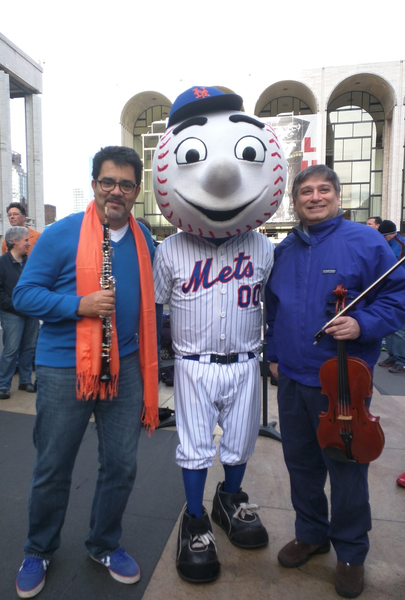The Kansas City Symphony Enjoys a Taste of New York
As Major League Baseball finalized its World Series matchup, on October 23rd during a Kansas City Symphony concert, KCS Music Director Michael Stern proposed a friendly wager to New York Philharmonic Music Director Alan Gilbert: if the New York Mets won the World Series the KCS would send Kansas City’s best BBQ, and when the Kansas City Royals won the Philharmonic would send New York’s finest lox and bagels. In addition to the food wager, the losing orchestra would have to perform, as an encore, a piece of music that features the winning city, and the losing Music Director would have to conduct the piece while wearing the winning team’s jersey. In a video message released on the Philharmonic’s Facebook page, Gilbert accepted the challenge. Because the Kansas City Royals finished off the New York Mets in Game 5 of the World Series, on November 12th the Philharmonic honored the first part of the challenge by sending Russ and Daughters’ lox, bagels, and schmear. The KCS musicians invited Kansas City Royals Hall of Famer George Brett to enjoy the prized meal, and they look forward to seeing the performance of “Everything’s Up to Date in Kansas City”, currently scheduled for December 29th with Kansas-born singer Joyce DiDonato.

George Brett enjoying his bagel and lox with a little bit of KC barbecue sauce
Photo courtesy of the Kansas City Symphony

Mr. Met poses with Pedro Diaz and Vincent Lionti
Photo credit: Billy Hunter
The MET Orchestra Pitches In
While the wager with Kansas City may have motivated the members of the New York Philharmonic to play a pep rally on the Lincoln Center plaza before Game Three of the Series, members of the MET Orchestra needed no such inducement to create one on the morning of Game One. Playing an arrangement of “Meet the Mets” by MET Orchestra trumpeter Peter Bond (which also included quotes from Carmen, Lohengrin, Die Walküre, and Siegfried), MET Orchestra musicians were joined by Chorus members, stagehands, electricians, props personnel, security personnel, and other employees. The guest of honor was the team mascot, Mr. Met, who conducted the performance.
Note: A video of the performance, as well as more information, can be seen here.
Chicago Lyric Opera Reaches Agreement
On September 22, 2015, the musicians of the Chicago Lyric Opera Orchestra ratified a three-year agreement that runs from July 1, 2015 to June 30, 2018. As the Chicago Lyric musicians prepared to negotiate this agreement, they worked extensively with Randy Whatley of Cypress Media, which led to a significant presence on Facebook, Twitter, and Instagram. In addition, the musicians created a Chicago Lyric Opera Orchestra website, an active email newsletter, a member blog, and an appealing graphic design for merchandising. Throughout this process the musicians discovered and cultivated new talents within themselves in the fields of writing, editing, communications, media relations, blogging, labor organizing, and managing social media accounts.
The silver lining of this very difficult and protracted negotiation was the solidarity and communal effort produced by the orchestra musicians. Their work to introduce the public face of the orchestra to the world vastly strengthened the position of the Orchestra Committee in the negotiation room by reminding the public, and Lyric Opera, of the world-class skill level, extensive training and experience, and passion and commitment these musicians bring to their jobs every day. This solidarity extended to the actual bargaining process, which began with a vote to authorize the Committee to return with only proposals it could recommend for ratification.
Throughout many months of negotiating, Lyric Opera made little movement on its demands for increased work hours on top of drastic reductions in wages and benefits for musicians as well as substitutes, extras, and stage band musicians. As the season began, the orchestra took a unanimous vote to authorize the Committee and the Union to call a strike if and when they felt that would be necessary. Finally, after several weeks of work with FMCS mediator Javier Ramirez and a short play-and-talk period, an imminent strike was avoided when Lyric Opera improved its offer to the point that the Committee and the Union were able to recommend it for ratification. The season began without a hitch and the reviews, especially for the recent production of Wozzeck, have been terrific. After an unusual delay of many months, Lyric Opera recently released its audited financial report for 2015 showing that the company finished last season in the black for the 27th of the last 28 years.
New Jersey’s New Music Director
On November 15, the NJSO held its usual annual dinner for 140 of its top donors.
What was unusual about this event was the guest of honor, the orchestra’s new Music Director—Xian Zhang. Xian is the 13th Music Director of the NJSO. She is the first woman and the first Asian to be named to the position. Hiring Xian was the result of a very musician-influenced process, elected musicians having comprised one-third of the search committee.
After the announcement and introduction of Xian, and her enthusiastic short speech (which included some very kind words about the NJSO musicians she was “looking forward to making music with”), she went to every table, met every donor in the room and made a personal first impression on all in attendance. Talk about working a room.
Xian was previously the Associate Conductor of the New York Philharmonic. She will continue as music director of the Orchestra Sinfonica di Milano Giuseppe Verdi, and has also recently accepted the position of Principal Guest Conductor of the BBC National Orchestra of Wales. She was the first woman music director of any Italian symphony orchestra and will be the first female titled conductor of any BBC orchestra.
Record Gala in Houston
The Houston Symphony had a record-setting Opening Night Concert and Gala for the 2015-16 Season, generating almost $1 million in earned and contributed revenue for the orchestra. The evening started with a concert featuring music director Andrés Orozco-Estrada and violin soloist Joshua Bell. The orchestra performed Gershwin’s An American in Paris, Stravinsky’s Firebird Suite and an arrangement of Leonard Bernstein’s West Side Story written for Mr. Bell. The gala honored Margaret Alkek Williams (celebrating her 80th birthday on the same evening), who recently donated $5 million to the Houston Symphony, which was the largest single contribution from an individual in recent history. Also, for the first time, a group made up of donors and board members donated enough money so that every member of the orchestra and a guest was invited to the Gala.
Large Gift in Indianapolis
The Indianapolis Symphony Orchestra recently announced that the Lilly Endowment Inc. would bestow a grant of $10 million, one of the largest gifts in the orchestra’s history. The intent of the gift, on the eve of the state’s bicentennial, is to allow the orchestra “to sustain and build on [its] contributions to the cultural vitality of the city and state,” said Ace Yakey, the Endowment’s vice president for community development, in a press release.
In its own press release, the orchestra indicated that it would use the grant to support an investment in technology (to enable audio and video streaming of select ISO performances at Hilbert Circle Theatre), to fund its defined benefit pension plan for ISO musicians, and to support its endowment.
Recently, the ISO has been enjoying tremendous growth, with consecutive years of both balanced budgets and double-digit increases in ticket sales. The orchestra also reported an increase in student ticket sales of 50% over two years.
Sounds of the Motor City
On November 20 the Detroit Symphony Orchestra premiered a work by Tod Machover. The commission, enabled by a $315,000 grant by the John S. and James L. Knight Foundation, was for a “collaborative symphony,” meaning that the work was informed in part by “sound submissions and conceptual contributions from the public,” according to a press release.
Symphony in D was not the first work of this kind by Machover, who is Professor of Music and Media at the Massachusetts Institute of Technology. He had already completed similar projects in Perth (Australia), Toronto, and Edinburgh; it was this last work, heard by the Knight Foundation’s vice president for arts Dennis Scholl, that catalyzed the grant.
Over the course of a year Detroit residents were encouraged to submit sounds, and Machover visited schools and community centers to hold workshops and to lead discussions. The resulting work was informed by more than 15,000 sound samples making up over 100 hours of audio. Machover and his MIT Media Lab colleagues also created various technologies as part of the project, including an eponymous mobile app that enabled users to record sounds and then tag them with geographical data, creating a “sound map” of the city.
Attending the premiere, University of Michigan musicologist Mark Clague said, “The most remarkable achievement of the Detroit Symphony Orchestra’s performance of Symphony in D was a resonant social counterpoint that entwined ensemble with community. Tod Machover’s final two movements, in particular, brought this civic polyphony to the fore, not simply through pre-recorded sounds or even the lyrics of local poets. DSO musicians performed alongside local students, techno musicians, a conga drummer, guitarist, and bassist, plus a gospel-tinged Chaldean choir that included both native Detroiters and recent immigrants to the city who had escaped war in Iraq and Syria to find a new home. At its best, music does not just represent our dreams, but shapes our lives. The DSO and Symphony in D did just that, casting the orchestra’s audience as artistic collaborators, to forge a creative, engaged, and hopeful vision of their city.”





